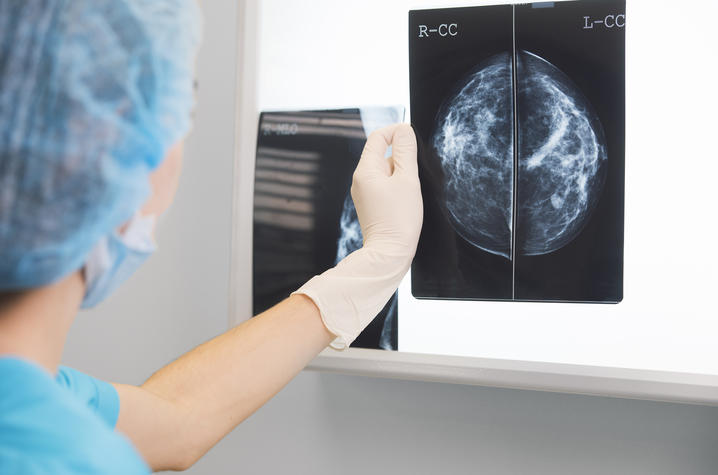Mammograms Remain an Important Part of Routine Healthcare During COVID-19

The University of Kentucky Public Relations & Strategic Communications Office provides a weekly health column available for use and reprint by news media. This week's column is by Drs. Emily Marcinkowski and Erin Burke, board-certified surgical oncologists at the University of Kentucky Markey Cancer Center.
LEXINGTON, Ky. (Oct. 12, 2020) — With public safety guidelines for COVID-19 still firmly in place, it’s easy to understand why women may think about skipping their yearly mammogram to avoid going out. However, cancer screenings – such as mammograms – are a vital part of a person’s regular healthcare routine.
According to the American Cancer Society, roughly one in eight women will be diagnosed with breast cancer in their lifetime; the ACS also estimates that 3,800 Kentucky women will be diagnosed with breast cancer this year. Yearly mammograms remain the best method we have for detecting breast cancer in its earliest – and most treatable – stages.
When should women have their first mammogram?
We recommend women of average risk begin yearly mammograms at age 40, which is when the overall risk of developing breast cancer increases significantly – one in six breast cancers occur in women age 40-49.
However, if you have a family history of breast or ovarian cancer, you may need to begin receiving mammograms at an earlier age. Talk to your doctor to determine the best screening schedule for you.
Should men get mammograms?
Male breast cancer is rare, but it does happen. Currently, there are no guidelines around regular mammogram screening for men, but a diagnostic mammogram should be performed if a man or his physician detects a lump in the breast.
Is it safe to get mammograms during the pandemic?
It is safe – and important – to keep up regular healthcare visits during the pandemic. Healthcare facilities across the country have enacted a number of guidelines to help keep patients safe when they need to come in for appointments.
At the UK Markey Cancer Center, we’ve implemented a number of precautions to protect our patients: proactive conversations with patients – like phone screenings prior to clinic visits, daily employee screenings, visitor restrictions, social distancing, and regular collaboration with our infectious disease leadership to stay on top of the ever-changing COVID-19 environment.
If you are concerned about coming in for a mammogram or other type of routine healthcare appointment, call your physician to learn more about what guidelines are in place to keep you safe.
What’s the worst that could happen if I skip my mammogram?
The most serious health risk of a skipped mammogram is a delayed cancer diagnosis, and some breast cancers can grow quickly. When cancers are found early, they’re often very treatable– the five-year survival rate for an early stage breast cancer (one that has not spread beyond the breast) is more than 95%.
A cancer diagnosed in a later stage may require more aggressive and extensive treatment, and may not be curable depending on whether it’s metastasized (spread) to other organs. By the time a breast cancer has spread to distant parts of the body – like the lungs, liver, or bones – that 5-year survival rate drops to approximately 28%.
With COVID-19 continuing to be an ongoing health issue for the foreseeable future, make it a point to keep up with your regular cancer screenings. It could save your life!
As the state’s flagship, land-grant institution, the University of Kentucky exists to advance the Commonwealth. We do that by preparing the next generation of leaders — placing students at the heart of everything we do — and transforming the lives of Kentuckians through education, research and creative work, service and health care. We pride ourselves on being a catalyst for breakthroughs and a force for healing, a place where ingenuity unfolds. It's all made possible by our people — visionaries, disruptors and pioneers — who make up 200 academic programs, a $476.5 million research and development enterprise and a world-class medical center, all on one campus.




